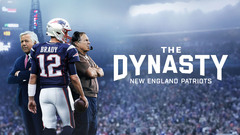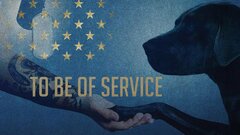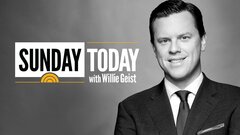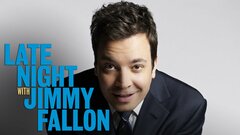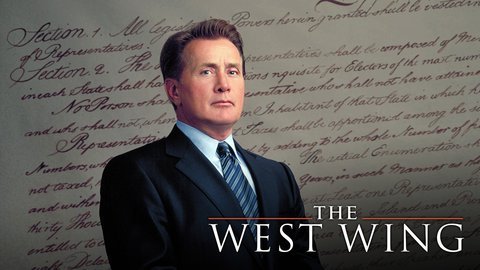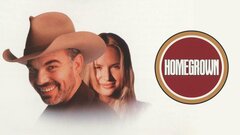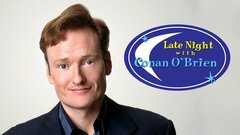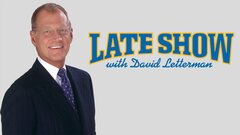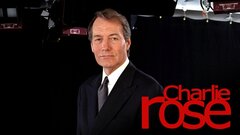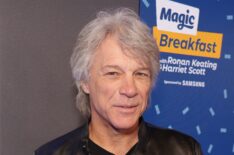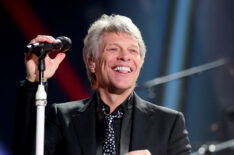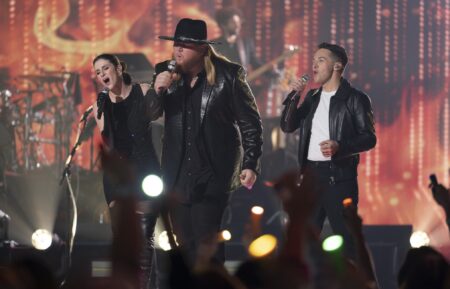The ultimate Jersey boy who made good but never forgot his roots, Jon Bon Jovi was the founder, lead songwriter and frontman for the hugely successful rock band, Bon Jovi. Powered by his movie star face and charismatic stage presence, the band ruled the 1980s, claiming their throne with 1986's seminal Slippery When Wet, which unleashed such anthems as "You Give Love a Bad Name" and "Livin' on a Prayer."
Their follow up, 1988's New Jersey launched the classics "Bad Medicine" and "I'll Be There for You." Branching out on his own, Jon's solo debut, 1990's Blaze of Glory gave him another No. 1 with the title track. The band continued to enjoy success, evolving as the musical landscape changed, and became one of the industry's all-time most successful touring bands.
Blessed with a natural acting ability, Bon Jovi embarked on an onscreen career. Although he often appeared in lower-profile projects, he earned solid notices for his turns in such films as "Moonlight and Valentino" (1995), "U-571" (2000) and "Pay it Forward" (2000) as well as a recurring role on "Ally McBeal" (Fox, 1997-2002). Proving that he and his band remained - outside of Bruce Springsteen - the consummate hometown boys, Bon Jovi became something of a national treasure. Displaying enormous career longevity and range for a "hair band" singer, Jon Bon Jovi was the rare entertainer who not only conquered the musical world, but found a way to call the shots, age gracefully and continue to create commercial hits.
Born March 2, 1962 in Sayreville, NJ, John Francis Bongiovi, Jr. was the son of two former Marines who later became a barber and a florist. (His stage and band name "Bon Jovi" was an adaptation of his real surname.) Fascinated by music his entire life, Bon Jovi cut his professional teeth playing in local bands and doing odd jobs in and out of his cousin Tony Bongiovi's NYC recording studio, Power Station Studios.
After his first professional recording, singing lead on a Star Wars-themed Christmas song, Bon Jovi managed to write and record some tracks of his own, including "Runaway," which became a local hit and landed him a recording contract. He pulled together his friends Tico Torres, David Bryan and Richie Sambora - who, along with Jon, became the core of the band's songwriting and a secret weapon in his own right - to form the band Bon Jovi, and their self-titled 1984 debut album launched "Runway" into a national hit. Led by Bon Jovi's unmistakable powerhouse voice, dynamic stage presence and movie star good looks in the form of a heavy metal rock star, the band quickly rose in popularity, opening for bands like the Scorpions and KISS, and developing an international following.
Although the group's second album, 1985's 7800° Fahrenheit, was only a modest success, it was well received around the globe and continued the band's impressive touring schedule, supporting the band Ratt; Bon Jovi himself made a solo appearance at the first Farm Aid that same year. For their third album, 1986's No. 1 with a bullet LP Slippery When Wet, they hired songwriter Desmond Child, who would prove key to their massive, world-conquering breakthrough. Powered by such arena-rocking sing-a-longs like the No. 1 hits "You Give Love a Bad Name" and "Livin' on a Prayer" and the power ballad "Wanted Dead or Alive," the record showcased Bon Jovi at their best and earned the band tons of MTV play, catapulting them to superstardom. A global smash, Slippery was named the top-selling album of the year and earned them an MTV Music Award, American Music Award and People's Choice Award.
So massive was their success that they headlined England's "Monsters of Rock" festival and continued their unparalleled career-long trend of embarking on a demanding but immensely lucrative touring schedule. Due to the band's success spearheaded by Bon Jovi and Sambora, the two were tapped to work with Cher on her self-titled 1987 album, which yielded the hit "We All Sleep Alone" and a lengthy professional collaboration with the singer. Going from strength to strength, the band's follow-up, 1988's New Jersey was another smash, hitting No. 1 and notching two No. 1 singles, "Bad Medicine" and "I'll Be There for You" as well as three Top Ten hits, "Born to Be My Baby," "Lay Your Hands on Me" and the too-racy-for-MTV "Living in Sin." After an enormously successful worldwide tour, they were chosen by the Soviet Union to become the first band officially sanctioned to play in the USSR, and their album was released on the national record label.
Reaching the pinnacle of musical success in so many ways, Bon Jovi had capitalized by touring nonstop and pouring themselves into the music and performances, but as the 1990s dawned and the landscape changed toward a more serious Seattle sound, each member went his own way. Jon recorded a solo album, 1990's Blaze of Glory, which served as the soundtrack for the Gen X Western "Young Guns II" (1990) and featured guests like Elton John and Little Richard. He also had his first taste of acting with a cameo as a doomed gunslinger. The title track not only went to No. 1, but won a Golden Globe and an American Music Award as well as nominations for an Oscar and Grammy. At the peak of his powers, Bon Jovi fired his management team and took the reins himself, and the band retreated to the Caribbean to vent, decompress and process their massive past success as they evaluated their uncertain future. A united front, they reunited to record 1992's Keep the Faith, which debuted to a very different world than that of their heyday. Grunge had replaced the glam "hair rock" of the 1980s, and Bon Jovi made headlines when he cut his trademark long tresses. Although musical tastes had irrevocably shifted, the band managed to evolve while maintain their roots. The album was still a modest success and earned them minor hits with the title track, "Bed of Roses" and "In These Arms." They recorded an acclaimed "MTV Unplugged" (MTV, 1989- ) appearance and embarked on yet another international tour. Their greatest hits set "Cross Road" (1994) launched a new smash cut, "Always," that became the band's all-time best-selling single.
After years fielding offers and speculation about his acting interests, Bon Jovi, who began to study acting in 1990, made his well-received acting debut in "Moonlight and Valentino" (1995) as the house painter who turns the heads of Whoopi Goldberg, Gwyneth Paltrow, Kathleen Turner and, in particular, Elizabeth Perkins. After 1995's These Days was a modest success and notched one minor hit, "This Ain't a Love Song," the band again completed an incredibly lucrative world tour. When the dust settled, the members elected to take a two-year hiatus from the band to pursue their individual interests. Back onscreen, Bon Jovi was tapped again for the complicated role of "The Leading Man" (1996) as a seductively mercenary actor who is willing to do anything to further his career. The following year, he released a solo album Destination Anywhere and filmed a 48-minute short companion film co-starring Demi Moore, Kevin Bacon and Whoopi Goldberg. He followed with a turn as an alcoholic bartender who falls for Annabella Sciorra in "Little City" (1997) and garnered praise for his work as the handyman boyfriend of waitress Lauren Holly in Edward Burns's "No Looking Back" (1998).
Next up, Bon Jovi appeared in an episode of "Sex and the City" (HBO, 1998-2004) and earned prominent supporting roles in the submarine drama "U-571" (2000) and as Helen Hunt's abusive ex-husband in the uplifting tearjerker "Pay it Forward" (2000). The band reunited and returned to the charts with 2000's Crush, which spawned a hit, "It's My Life," that served as an update of "Livin' on a Prayer." A modest success, the LP earned two Grammy nominations and inspired VH1 to devote an episode of "Behind the Music" (VH1, 1997- ) to the band. Successfully uniting longtime fans and newfound fans alike, Bon Jovi continued to reign supreme as one of the all-time most profitable touring bands, completing another international tour and releasing a related album, One Wild Night Live, 1985-2001. In the aftermath of 9/11, the band lent their time, funds and performances to raising money to benefit victims of the attack and relief workers, including appearing in the Madison Square Garden Concert for New York. Continuing to act, Bon Jovi recurred as a love interest for "Ally McBeal" (Fox, 1997-2002) and starred as a slayer in "Vampires: Los Muertos" (2002). Musically, the band followed up with 2002's Bounce, which spawned the Grammy-nominated hit "Everyday;" reworked and recorded 12 of their greatest hits for 2003's This Left Feels Right; and released a milestone retrospective piece, 100,000,000 Bon Jovi Fans Can't Be Wrong, in 2004 which commemorated the 20th anniversary of their first record.
The year 2005 brought another LP, Have a Nice Day, which sent the band in a new direction, with the title cut becoming a minor hit and a second single, "Who Says You Can't Go Home" becoming a Grammy-winning, country No. 1 as a duet between Bon Jovi and Jennifer Nettles of the band Sugarland. Although their subsequent tour was shorter than their previous ones, it became another monster success, grossing almost $200 million, and serving as the perfect entrée to their 2006 induction into the U.K. Music Hall of Fame. Their mainstream chart momentum slowed a bit with 2007's Lost Highway, which sent them farther into country music, but earned them considerable critical acclaim, including a CMT Music Award for "Till We Ain't Strangers Anymore" and a Grammy nomination for the record as well as for its lead single, "(You Want to) Make a Memory." The subsequent tour, however, broke all their previous records, becoming the highest grossing tour of 2008 with more than $200 million in sales, according to Billboard.
In 2007, Jon Bon Jovi hosted "Saturday Night Live" (NBC, 1975- ) and appeared as a mentor on "American Idol" (Fox, 2002-16) in an episode where all the contestants performed his band's music. A documentary on Bon Jovi, "When We Were Beautiful" (2009), debuted to acclaim, and that same year saw the release of The Circle, a return to rock after their country detour. In 2010, special editions of all Bon Jovi albums from 1984 to 2007 were re-released as well as a double-album greatest hits set, and the band embarked on what Billboard ranked as the most profitable tour of 2010, earning almost $150 million. Something of a national treasure by this time, whose music was part of pop culture consciousness and a well respected elder statesman of rock, Jon Bon Jovi continued to enjoy multiple opportunities and enormous goodwill, including a funny, self-lampooning guest spot on "30 Rock" (NBC, 2006-13). Fans were delighted to hear that Bon Jovi, who had so often turned in excellent performances in underrated or lower-profile films, had nabbed a plum role as a rocker in the ensemble romantic dramedy "New Year's Eve" (2011).
By Jonathan Riggs




